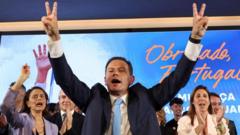In a fiercely contested political landscape, Portugal's governing party emerges victorious in a snap election, reaffirming its stance but struggling to secure a dominant position.
Portugal's Democratic Alliance Wins Snap Election but Lacks Majority

Portugal's Democratic Alliance Wins Snap Election but Lacks Majority
Portugal's right-of-centre Democratic Alliance celebrates victory again, yet no majority is attained.
Portugal's right-of-centre Democratic Alliance has emerged victorious in the latest snap parliamentary elections, marking the third election in as many years. However, the party, led by Luís Montenegro, has once again failed to secure a majority in the Assembly. While expressing optimism, Montenegro vowed to "stimulate investment" and "guarantee prosperity and social justice" to his supporters during a celebration in Lisbon.
The opposition Socialist Party, led by Pedro Nuno Santos, faced a significant setback, resulting in his resignation after the party's lackluster performance. The Socialists saw a substantial loss in seats and now find themselves in a tight race with the far-right Chega party. The situation could worsen for the Socialists as international voting results, which take several days to tally, may potentially place them behind Chega, which secured two out of four seats in last year's election.
André Ventura, the leader of Chega, hailed the election outcome as "historic," claiming it signifies the demise of the previous two-party dominance that has characterized Portuguese politics for decades. Ventura's campaign, focused heavily on immigration and corruption, has apparently resonated with a segment of voters disillusioned by political scandals, including those involving the current government.
In his victory speech, Montenegro expressed gratitude towards his family and "political family" for their unwavering support during tumultuous times, particularly as he faced scrutiny over business dealings predating his leadership. This controversy played a key role in instigating the recent election following a lost vote of confidence in the government.
Conversely, in a farewell address, Santos underscored his belief that Montenegro is unfit for the role of Prime Minister, hinting that the Socialist Party should persist in challenging this narrative. The political climate in Portugal continues to evolve as parties regroup and reassess their strategies following the latest election outcomes.




















